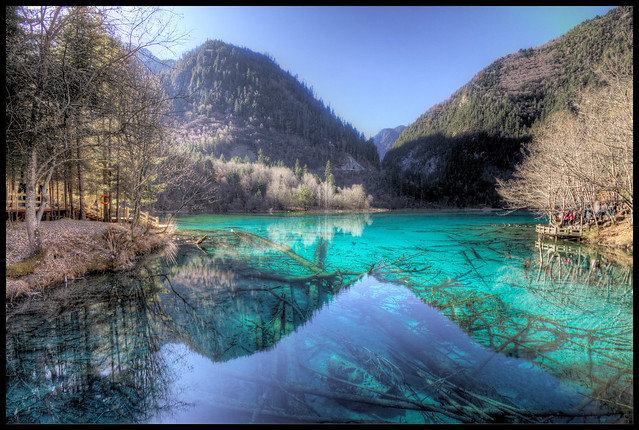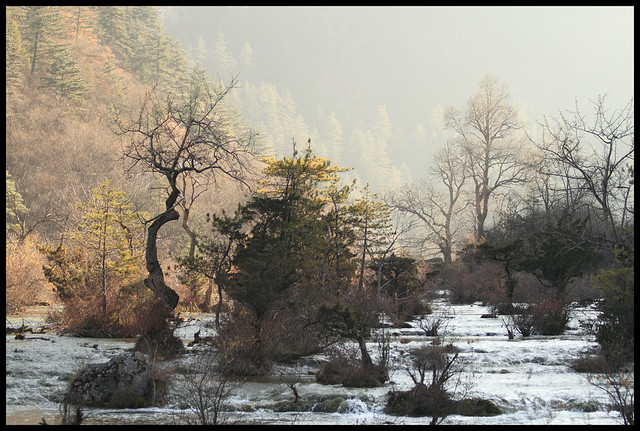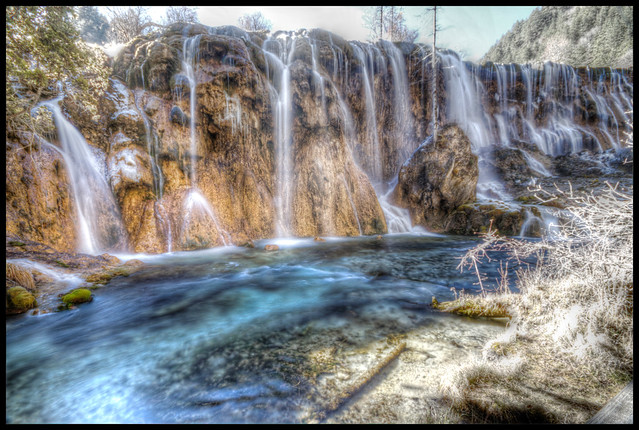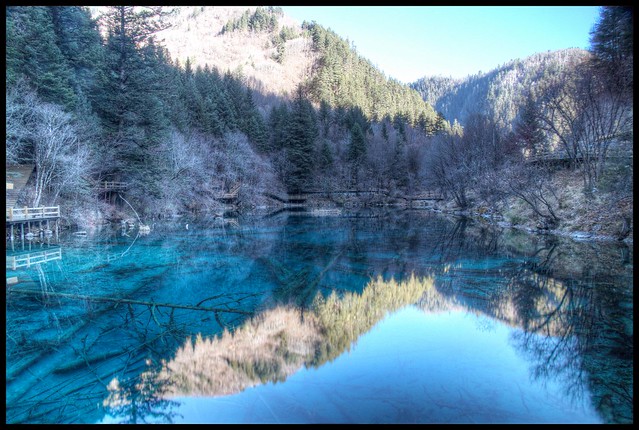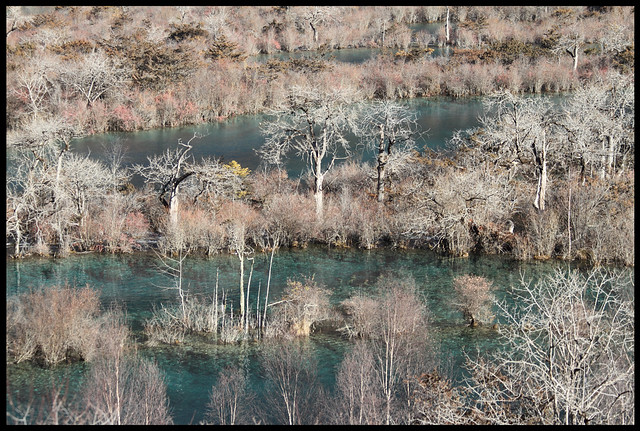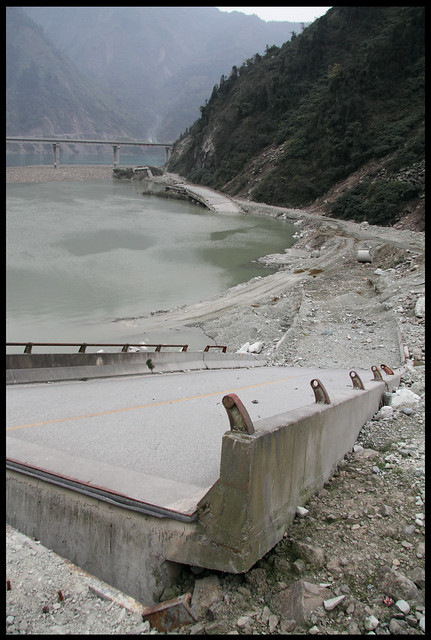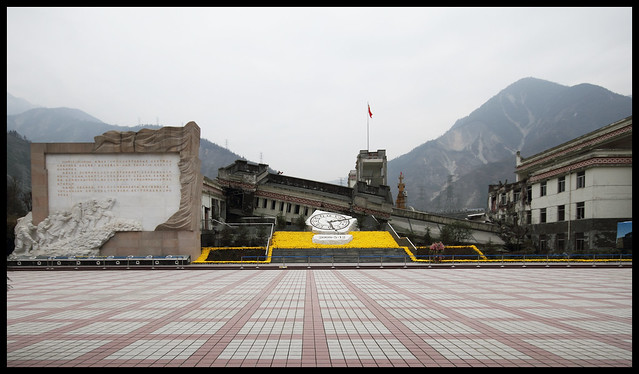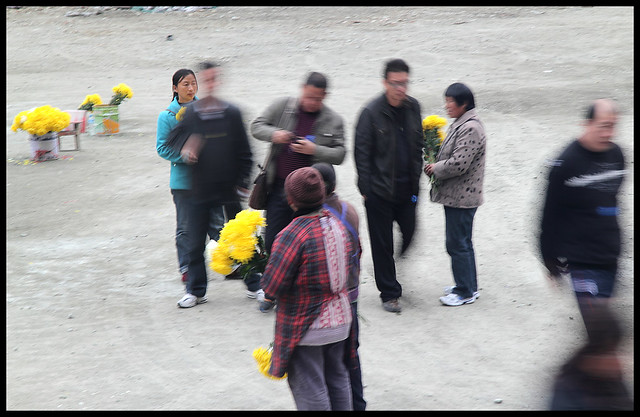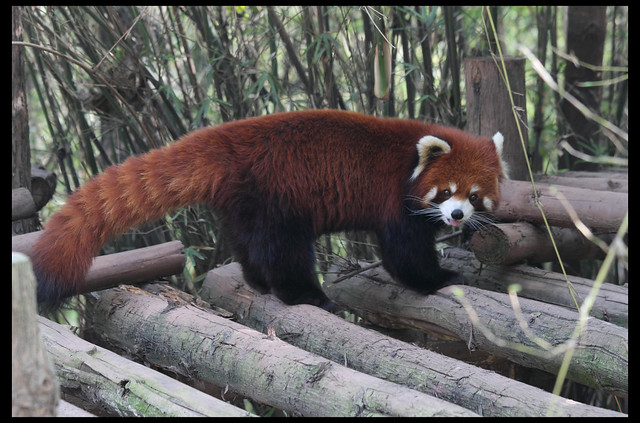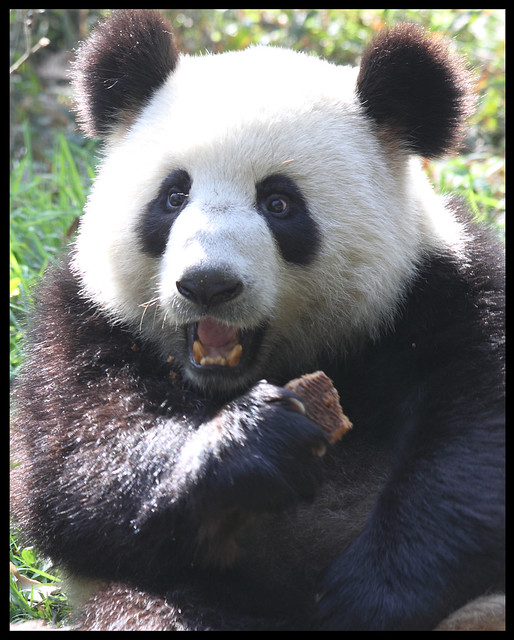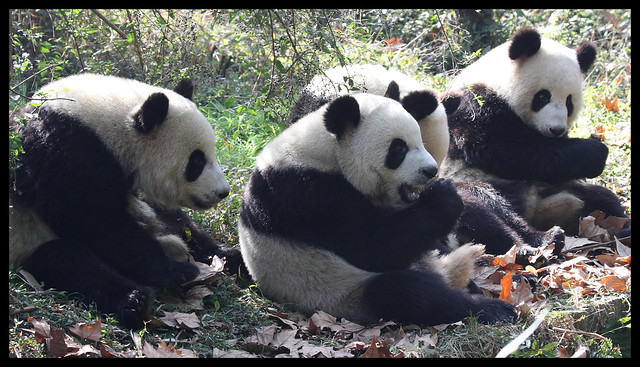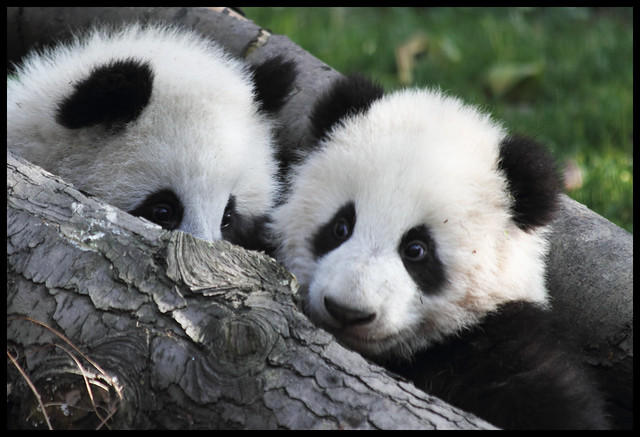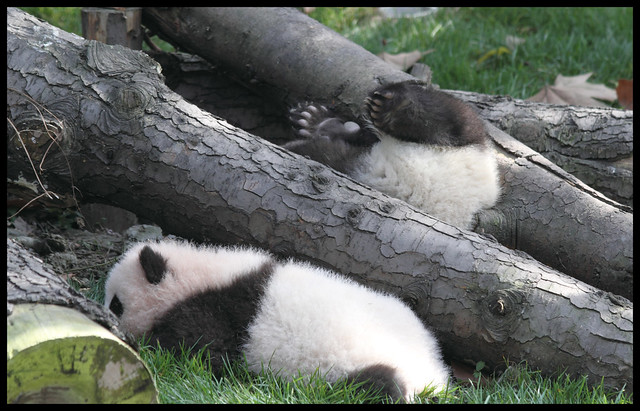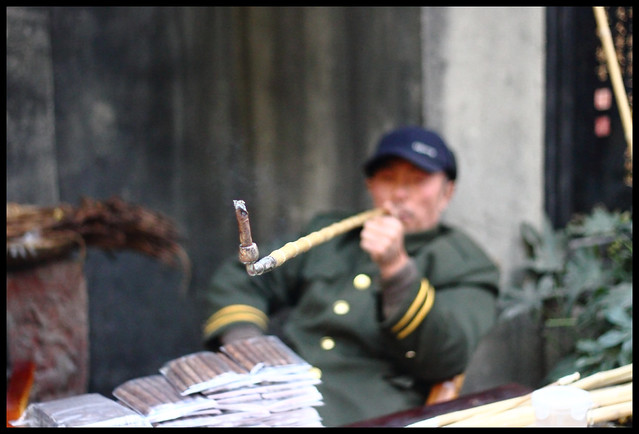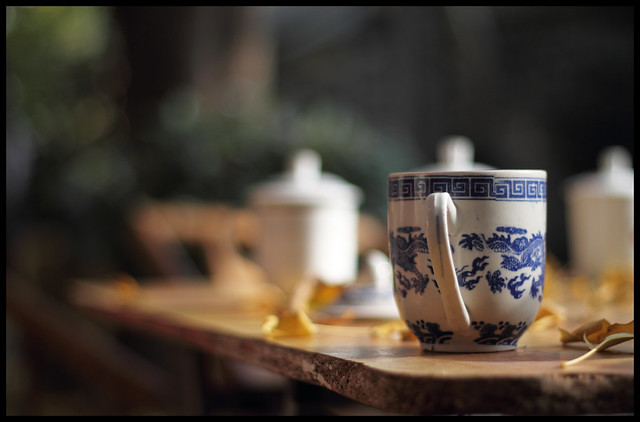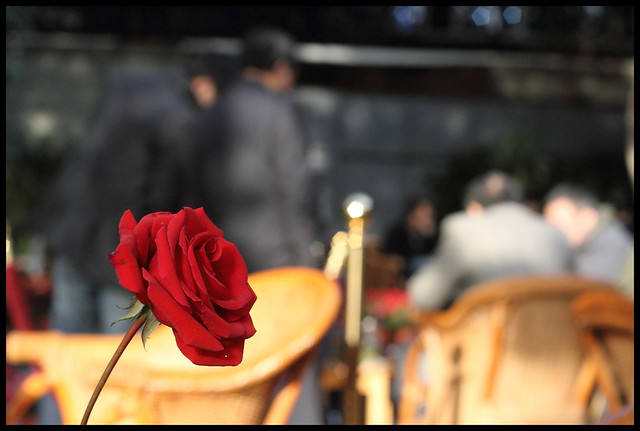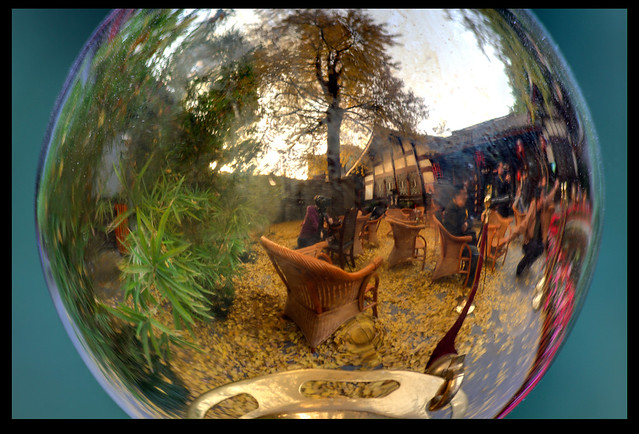A Chinese bus tour to Jiuzhaigou - or a lifetime of cultural experiences in three days
In response to a friend who told me that I would give an excuse about not writing this post due to too much current chaos in my life, thank you for giving me an extra motivation for getting this written, titivations and all!
I wanted to write a post about the trip I made last week to northern Sichuan where I had without a doubt the most interesting cultural experience of my time in China - spending three days on a Chinese tour-bus as the only foreigner.
I return to Europe now after two months in East Asia, six weeks in China and two in South Korea, tired, but very happy with how the program at the KITPC went. I'd been getting this ready for two years, on and off, and the last few months have involved a lot of work getting everything prepared for the start. Once the program began I had the dual responsibilities of keeping things going with talks and discussion sessions, as well as showing friends, colleagues and collaborators who had come out to the program, the Beijing that, thanks to my short time there I seem to know better than many locals. This was a hugely enjoyable task, though after six weeks I was about ready to drop and a two week trip to Korea, working at the APCTP in Pohang and CQUEST in Seoul was a welcome break.
On return from Korea I attended the last two days of the program, said a few goodbyes, and then took off again from Beijing Capital into central China, to Chengdu, the capital of Sichuan province where I was going to treat myself to a photography based trip for a long weekend. My destination was the northern Sichuan mountains, and in particular the valley of Jiuzhaigou, where I went three years ago and learnt a huge amount about photography in the process. Last time I had done everything pretty ad hoc, without booking hotels or arranging my stay during the days in the mountains at all, and it had worked out well. I had arrived from Chengdu, found a bus going the six hours in the right direction, got into the town late at night, found myself somewhere to sleep and then went into the park just before daybreak the next morning.
After asking a friend to help book a flight this time from Chengdu to Jiuzhaigou airport I was told that there was also the option of a deal with a bus trip into the mountains all the way from Chengdu, including accommodation, food and entry to the park for a four day trip for just 45 quid. This sounded like an excellent deal, and having flown in before, i thought the bus ride seemed like a good alternative.
My alarm went off at 4am and I dragged myself to the reception in the hotel in Chengdu, ready for a lift to the main bus pick-up point. By five thirty I was standing with 70 others being bullied by enthusiastic sellers of travel pillows and exotic breakfasts, waiting for buses to various destinations around Sichuan and by 5.45 I was on the bus, crammed in at the back with 35 Chinese men and women from all over the country. Two things were unsurprising at this point, 1) I was the only non-Chinese in the group and 2) I attracted a lot of confused attention. As normally happens in these situations I was spoken about for some time until they realised that I understood Chinese (to a greater or lesser extent) at which point a barrage of questions came my way. These questions came most of the time not in Putonghua, the normal Chinese dialect, but a range of dialects stretching from Shaanxi, Shanghai, Guangzhou, Jiangxi and Sichuan. I struggled a lot of the time to grasp what was being asked, and this continued through most of the trip, though there were a few on the bus who could speak the normal dialect, including the tour guide - I'm still not sure if this was a good thing or not. The guy I sat next to throughout spoke with a very strong Shaanxi accent and I understood perhaps a sentence or two a day of what he said to me.
At 6am we left, set for an eight hour drive ahead of us, and I sat back, ready to get some shut-eye. At this point the tour guide (导李 - 导游 is tour guide and his name was 小李)got up at the front, and with a perky 大家好! started to tell us all about the trip ahead, and about Jiuzhaigou, and the regions of the Northern Sichuan, and the history of the area, and the number of kilometers of road constructed in the last decade, and the stories of previous tour groups, and the local dialects and....well, you get the picture. Three hours later he stopped his stories, admitted that he should let us rest for a bit and finally I drifted off, ready to doze until lunch.
Indeed, I managed to sleep deeply until lunch, but somehow lunch arrived very very early and at 10.30 in the morning we found ourselves in an unheated restaurant, with plates of simple food in front of us, mostly vegetables, the only meat on offer being processed sausage meat which was occasionally thrown in with the veg.
One thing that needs to be mentioned at this point is about heating, something that became an over-riding theme for me for the trip. In Beijing, although the temperatures in winter may dip below minus 20 on occasion, the buildings are heated with central heating - government controlled, and switched on some time around the beginning of November when the authorities deem it cold enough to give the people some warmth, the reverse process taking place some time around March. In the South of the country, roughly from the line of the Yangtzi river down, although temperatures may not get that cold through the winter months, they have no such luxury as central heating and spend the winter much much colder than their northern brothers and sisters. Indeed in Chengdu, where the temperatures may hover around the 5-10 degree mark this isn't much fun, but at 2500m in the mountains of Northern Sichuan, where temperatures spend most of the time below zero, this is not a joke.
I'm not good in the cold and I sat the first day in the unheated restaurant at 10.30 in the morning, shivering in my coat, scarf and hat, digging into 馒头 and simple plates of vegetables while a barrage of questions came my way. Cold, tired and a little confused, it wasn't perfect, but I was at this time aware of the fact that this was an interesting experience to be going through.
Interestingly, through the three days of the trip (it was cut short in the end by a day) I wasn't once asked my name and no name from anyone else was offered to me. This wasn't just because I was foreign, as I never heard anybody else introducing themselves, even though many strangers had come together for the first time to spend an intense few days together. I should also note that had I been introduced to everyone I would have had a very hard time remembering their names. Five years after arriving in China for the first time, remembering Chinese names is still something that I struggle with.
After a ten minute lunch (the first day was quite a leisurely lunch and by the end of the trip, restaurant lunches had been reduced to five minutes of quick slurping and scoffing, frequently taken standing up) we were back in the coach and continuing our winding route up into the mountains.
An hour or so later we hit our first problem as traffic was held up by a landslide on the mountain path. We, sat, patiently as people craned their necks and got out of their cars, but I didn't hear a single complaint about the fact that nothing was happening. Nor did people complain about the fact that smaller cars were overtaking the line of stationary vehicles, thereby blocking both lanes of the narrow road and, when finally the bulldozer arrived, making it virtually impossible for it to get through to the scene of the blockage. When the landslide was cleared we were then left with another conundrum. There were now two lanes of vehicles facing each other, as on both sides of the landslide people had vied to be first in line, and we sat there cars honking and people waving as nobody moved.
It was another half an hour until the congestion was cleared, but again, there was no pointing of fingers and blaming of the people who had blocked the lane of oncoming traffic, and on we went. Each time this happened in the future and I saw the inevitable log-jam build up I would curse the senseless drivers who, through their selfishness wanted to be first in line, thus holding up the whole flow. Of course I kept this to myself as everyone else sat back and either didn't think through the consequences of the overtakers, or just didn't care. This is one of my over-riding annoyances in China, that the selfishness of the individual on the road, although possibly helping them for a few seconds, will add to the burden of traffic and in the end, holds everyone up. The idea of a communist society where the group is more important than the individual seems to be left behind when the car keys are in hand. This is true also of pedestrians and cyclists however who will cross the road without looking where they are going, cars swerving and breaking to avoid them in a bizarre ballet that seems always to be on the edge of disaster and puts me on the verge of a heart-attack several times a day.
An hour later we hit another landslide, this time at the entrance to a tunnel, and again, the same story. This time however the problem of oncoming traffic was faced inside the tunnel which had recently been built and only allowed for a single vehicle to go through some sections, which were still bumpy and wet from recent rains (the tunnel was open on one side). The driver revved the engine to get over a bump and out of the way of an oncoming motor-bike with an enormous loading platform attached to the back. All of a sudden the bus juddered and there was a huge shearing sound followed by a bang. The driver ran to the back of the bus, opened a panel in the floor and got to work on the transmission which had just snapped. Stuck in a tunnel, in the mud, with oncoming traffic facing us, their horns echoing through the small space and a driver running back and forth taking everything from bunches of wire to silk scarves to the back to reattach the transmission, I wondered why I hadn't taken the plane. It truly felt like we were in an impossible situation, but incredibly, after a couple of hours of sweat and concerned looks from the driver, a fragile transmission was reconstructed and, after much toing and frowing, we made our way around the oncoming vehicles.
Not only was the ad-hoc piece of DIY impressive, but the patience of everybody was truly inhuman, or at least un-occidental. There wasn't a single complaint, a raising of voices or eyebrows (except from me as my eyebrows have a life of their own when it comes to expressing opinion), or even a questioning of progress. Everybody sat back and waited, chatting happily in the cold and the semi-darkness. This is in great contrast to taking a plane in China in which the businessmen get very nasty very quickly if the plane is delayed even a few minutes. The difference between those with and without money, and working in the business world in China appears marked in their expectations of others. Many of those on the trip had taken buses or trains to Chengdu, the budget option but often taking a couple of days. These were not rich Chinese off for a jolly between meetings, but nor where they at the economic level of the migrant workers who come into the cities to find work.
Anyway, we made it out, and on our way, changing gear carefully until eventually we stopped off a few hours later outside a small house where the driver found the right contraption to give the transmission a more stable constitution. It took some time, and a few failed attempts and as we sat there and the time ticked by I was getting ready to take my passport from the tour guide, my bag from the bus and hitch hike the next few hundred kilometers to Jiuzhaigou, where I would have been quite happy to find my own accommodation and sort out the next few days independently. However, just before my patience ran out (though I seemed to be the only person getting restless - internally I should note) the bus started up again and we were on our way. The next few hours went by peacefully and without event and at 8 in the evening we arrived into Jiuzhaigou, where I was ready to have a bite to eat, shower off the day's stresses, and collapse into bed.
It became clear pretty quickly that things were not going to be so easy. We checked in and sat down to dinner (the same, simple but perfectly edible food we had had for lunch, and the same that we would have throughout the trip), shivering in the cold as the doors to the freezing mountain air outside stood wide open (the idea of shutting doors when there's no heating inside seems anathema in China - the fresh air seeming to be a positive thing). After five minutes the power suddenly cut out and we were left, not even able to see our breath condense in front of us as we sat in an amused semi-silence.
Candles were distributed and I made my way into my room where I sat on the bed and wondered what the hell I was doing. It was too cold to get undressed, so I got under the covers, coat and all with an extra layer of socks and tried to drift off to sleep, the impotent electric blanket lying uselessly under me. An hour later I got up to check the situation and found that the power was back on and the electric blanket saw that in the end I had a reasonable night's sleep. This was me, in my room, by candlelight wondering what the hell I was doing:
6 am we were up the next day and although the driver had asked us to all be on the bus by 7, all seats were filled 15 minutes early and so we headed off to the gates of the park. This would be unheard of with a Western tour group, and the only such trips I've been on, there would always be the odd few stragglers who would hold up the morning starts. Here however there wasn't a single moment that we had to wait for anyone, and every time we left before our agreed upon time.
We drove the few minutes to the park, the tour guide adding a few additional embellishments to the hours and hours of information he had regaled us with the day before and by 7.15 we were in the park, making our way to the highest reachable point in the West of the valleys.
My biggest fear was that we would have to go around the park in a group, following a flag and all wearing identical red caps, but thankfully once in we were free to do our own thing, so I set off, camera kit in hand and started taking photos of some of the most beautiful scenery on Earth.
Jiuzhaigou is so spectacular that it's almost unreal. The valley is around 20 km long , rising 1500 or so meters to its summit (at around 4000m) and the river that runs through its basin flows into crystal clear lakes where the copper compounds give some of the most vibrant colours I've seen in any natural setting. Between the lakes are stunning waterfalls you find hidden behind moss covered forest floors.
I had planned, like last time I went, to walk the length of the valley, thereby escaping the crowds who take buses between the scenic spots, but sadly, because it was winter, the paths were closed and the buses were the only option, so I took the buses and made my way down the first valley, experimenting with my camera along the way. Though the winter means that the footpaths are closed, it also means that the skies are clear and this was one of the main reasons I'd chosen to come back. I was hoping for snow on the ground and blue skies, and while the former hadn't yet arrived, the latter was spectacular and I got the bright colours which had been lacking last time with the white blanket of fog reflecting off the blue waters.
In terms of photography I had a few new tricks up my sleeve, and a few more years of experience. For landscape shots I had a 10-20mm sigma lens, I had two neutral density filters (ND8) for long exposure shots of the water and I had a 70-300mm lens for zoom. This along with the Canon 7D I'd brought not long before meant that the new bag of tricks should have given me quite an advantage over the last trip.
I'll detail the rest of the trip soon, but in terms of the results I'm still not that happy. I still have a great deal to learn about composition and technique, but every time I go somewhere like this I find there's a huge learning curve. I'd like to spend a week or so in this sort of situation, going through my photos in the evening and reassessing what went right and what didn't. There are some major compositional changes I'd make to my photographs the next time and some technical alterations, especially in that I would use liveview for every shot and mirror lock-up for added stability, even on wide angle landscape shots. Anyway, although I am only happy with a handful of the couple of hundred shots I came away with this has taught me a lot and I look forward to coming back for a third attempt in the future.
So, I made my way down the valley, finding as many photogenic spots as I could, and attempting to battle with the brights of the sky and the snow on the higher peaks together with the shadows of the trees and mountains.
(*NB, though I've altered the dynamic range to be able to catch the lights and darks, I haven't increased the colour intensity on any of the above photos. I have a video I took at one of the lakes to show that this is for real*)
As I stopped off in each place I would frequently be called upon to be in a shot with a Chinese man or woman, who wanted their photo taken with the only foreigner in town, and an incredibly tall one at that. At one point I was stopped by a group of four women from Guangzhou and asked to pose with each of them individually and then in an ensemble of dissonant heights. They didn't know at first that I could understand them (they were speaking Mandarin as one of the women was not Cantonese) but I chipped in after one of them made a particularly amusing comment and we all started chatting. I haven't seen a lot of TV in China, but from what I have seen a large proportion of it is taken up with game shows and chat shows with young women gasping excitedly in what seems to be mock amazement at the answers and actions of guests. I'd always presumed this was somehow put on for TV but for the first time I was the centre of this as my answers brought on ever higher shrieks of excitement: British, from Oxford, scientist, post-doctoral researcher, worked for the Chinese Academy of sciences (this is the most prestigious science institution in the country and has an amazing reputation, apparently known to every Chinese man, woman and child), currently working for a Spanish University, etc. etc. It was fun to be the centre of attention for a little while and as we spent the next couple of hours going through the valleys together I basked in my few minutes of stardom, posing whenever they begged for a photo. At the end of the tour through the valley we parted ways, as their tour guide looked on disdainfully at the pouting women.
One of the deals with the tour was that I would have to pay to see a cultural show, put on in Jiuzhaigou town. In fact there were two of these, but having attended such performances before I agreed only to see one of them - most other people on the bus seemingly going for both. After resting in my room for a bit (still without a shower as the water was off during the early evening and cold the rest of the time) I went along to the theatre and after again having a huge amount of attention from the performers who greeted us at the entrance I sat down for two of the coldest hours of my life. The enormous theatre, again with doors open to the outside world was sub-zero and I sat, wearing five layers on top, shivering uncontrollably for the duration of the show. The show itself was a mix of ethnic songs from the local minority groups, dances, outlandish costumes and the recreation of various ceremonies from the traditional cultures of the area. All of these would be extremely interesting if all Chinese performances weren't infused with an enormous dose of what has been perfectly described as the Spring Festival Craptacular, a garish over-performance of kitsch nauseating flamboyance. Melodramatic pop songs sung with heart-rending passion and stomach-churning over-production together with pseudo-grinning dancers pretending to play traditional drums as the recording blasts at 120 decibels over the top of their prancing around tells me little of local culture and a great deal about the clash of Communism and 20th century Western entertainment. Anyway, after two hours of frozen feet and painful muscles, having spent the whole time in convulsions, I was free to leave the theatre and go home to collapse. I had dreamt throughout the performance of running off to find a foot massage place but in the end I was so tired that all I could do was to crawl on top of the electric heater on my bed and fall immediately asleep.
The third day was another 6 am start and although the plan had been to head to Huanglong, we were told that because of the lack of rain and the very cold temperatures up at 5000m it wasn't going to be worth visiting and so we would head back to Chengdu a day early. Our way back was paved with stops at local jewelry factories, traditional Chinese medicine centres and a yak-meat retailer. These presumably are the real way that the tour is able to function, as although the people in the bus had paid little for the trip, a few of them spent fairly enormous amounts on outlandish pieces of jewelry, gems and bunches of winter worm, summer mushroom. Nobody could resist buying a few bags of yak meat, having about 50 spicing options available and I bought a few bags for thank you and goodbye presents for friends in Beijing.
After another 10.30 lunch we started the final 8 hours back home and along the way the tour-guide started telling us about the various rock-falls on the opposite side of the river to the road that we were taking. He spoke of collapsed tunnels, and death-tolls, of cars trapped under enormous boulders and of falling mountain-sides, as the rocks above us teetered precipitously. There were a few key-words that I couldn't understand from his explanation and I asked a girl behind me, who I had just discovered spoke excellent English, what this one particular word meant. It then clicked, that the whole discussion was about the Earthquake back in 2008 which had completely devastated the precise area we were driving through. The road we were on was new, not because the previous one had been old, but because in most places it simply didn't exist anymore, having been torn to pieces in May two and a half years ago.
The stories were terrifying and I realised that the place we were headed for, as an alternative destination to Huanglong was Wenchuan the epicentre of the Earthquake and the village which had been devastated by the tremors and the landslides, the side of the mountain which overlooks the valley having fallen into the village and killed thousands upon thousands of residents. We arrived in the early evening and looked around what is an incredible testament to the energy and effort of the Chinese in times of trouble. The village has been all but rebuilt with houses vastly superior to anything they would have had before and a spectacular modern school to replace the one that was buried in the landslide. This of course cannot replace what has been lost, but the effort that has been put into this is place which lost everything is truly remarkable. A good friend of mine went to the village a year after the Earthquake and looked after the children, all of whom had lost family members and friends and many of whom were still in intense trauma, neither smiling nor speaking. She described to me her experiences there where she had volunteered for a week, and the stories were a combination of the amazing strengths of humans and the terrible effects of the disaster.
Throughout the village there were people selling locally made handicrafts, not of the finest quality and whereas I would not normally buy much from these stalls I went a bit all out and filled my bag with a fair number of trinkets and fabrics. I found the whole thing a bit strange as the others in the group bargained as furiously as ever with the sellers, I felt completely unjustified in doing so, however much it was expected and however much the prices were inflated to take into account the bargaining process, telling someone that a bag they are selling is far too expensive may be a fun game in Beijing, but not standing next to the ruins of a school!
And on we went, eventually arriving into Chengdu a little after dusk. I had expected to arrive into Chengdu the next evening and then leave early in the morning, but unexpectedly I'd found myself with an extra day. Although I know Chengdu reasonably well, I'd never been to see the star attraction of Sichuan and so early the next morning I made my way north of the city to the panda reserve, which has just celebrated the birth of the 300th panda, a landmark which they had been aiming for for some time. A few photos follow and not much commentary is needed. Pandas, both giant and red: very cute, very playful, very photogenic.
I went in the afternoon to one of the areas I'd explored before in the West of the city which is a group of streets filled with some of the best food in China, tea houses galore and a recreation of what the city would have been like 100 years ago.
Unfortunately in the last three years a lot of the tea houses that I visited before have been taken over by fashionable cafes and a lot of the places are exorbitantly expensive and full of tourists, but I did manage to find myself in one of the nicest remaining tea houses where I sat down with Landau and Lifshitz and sipped chrysanthemum tea for a couple of hours.
I sat in the garden of the tea-house, under the branches of a wonderful yellow-leaved tree as locals chatted around me, played games and ate endless supplies of sunflower seeds. From time to time a photographer would come in to take a photo of the tea-house in the shadow of the tree and I discovered on speaking to them that the tree was almost a thousand years old and a renowned tree throughout the city. They all arrived with giant tripods and wide angle lenses in hand, trying their best to get both the giant spread of the tree, and the layout of the tea-house in shot. This seemed like a pretty difficult task so I turned my camera the other way and took some photos of the small golden balls on top of the posts separating areas of the garden, attempting to get a fish-eye view of the grounds, tree, tables and all.
I got some curious looks from the other photographers but when I showed them the results, everyone turned their cameras round and started following my idea. This is definitely my most successful if not only instance of trend-setting amongst photographers.
In the evening I indulged in some of the great local cuisine before an early night and a trip back the next morning to Beijing. The last 24 hours in Beijing was packed with seeing friends, some last minute shopping and the conundrum of how to pack two months worth of purchases in some relatively small bags. The answer in the end was to send all the books I'd brought in the post to Germany where they should arrive in three month's time.
The trip back to England was a long and tiring one: nine hours Beijing to Doha, four hours wait in Doha then seven hours Doha to Heathrow. The final leg was made a lot more interesting as I was sat next to Graham Brown-Martin, the founder of Learning without Frontiers who spends his time going between the worlds of technology, education and entertainment, trying to bring the education system screaming and kicking out of its industrial revolution era mold and into the era of interactivity rather than passive learning which is being made ever more exciting by the technological advancements going on right now. I spoke to him of Clay Shirky, Sir Ken Robinson and many others that I know from TED and other such sites and it turns out that he spends a good load of his time with these people when he's not discussing in Westminster, trying to persuade the monoliths of government that perhaps a teacher standing at the front of the class and regurgitating lines is not the best way for kids to gain understanding and creativity. Anyway, we spoke a great deal and if time allows I will go to see an event he's organising with Sir Ken Robinson in London in March.
So, 24 hours in London seeing friends and now I find myself waiting in A Coruna for the train back to Santiago where I have ten full days to finish a bunch of reports, hopefully a paper, give a public colloquium on atmospheric optics, and many last minute odds and ends before I leave officially on the 20th for Christmas. 2010 has been an incredible year and I've had so many wonderful opportunities. I'll do my best to wrap up some of these in the next two weeks as well!

